
Sid Meier's Civilization computer game seems ripe for conversion into a board game. The PC game is, after all, basically just a computerized board game that plays out on a grander scale. Sid himself was inspired by many classic board games, including Risk and Axis & Allies. Fantasy Flight has already taken a stab at trying to distill the core mechanics of Civ down into a digestible board game when they released Sid Meier's Civilization: the Board Game back in 2010. I really like that game, even though it is a bit bloated and unwieldy. Attempting to directly translate Civ's mechanics down into board game form unsurprisingly results in a fairly complicated game that takes a very long time to learn and play.
Fantasy Flight's approach this time around seems to be to develop an elegant board game, and then apply the Civilization license onto it. The result is a board game that feels much more distant from the computer game, but which plays much more smoothly as a board game.
Civilization, streamlined
Perhaps the biggest problem with the older Civilization board game is the game length and amount of downtime. Games could run for over five hours, and the fact that each player resolved their entire turn phase (city management or army movement) before moving onto the next player meant that you could end up sitting for 20 to 40 minutes, twiddling your thumbs and waiting for other players to resolve their turns. That is one of my biggest peeves with a lot of epic games: too much downtime.
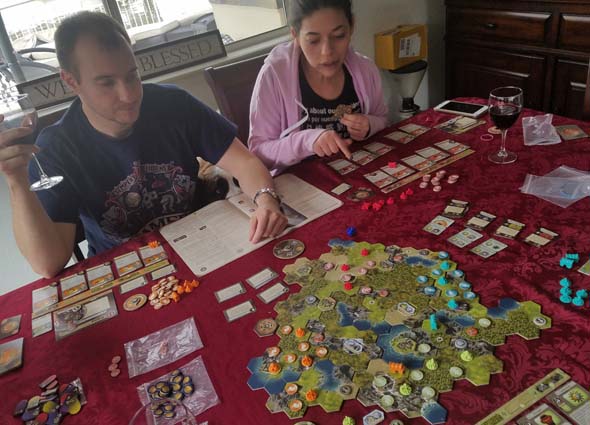
A New Dawn is a very elegant game.
A New Dawn addresses that problem by having each player take only a single action in each of their turns. There are no phases; just take an action from your focus bar and then move on to the next player. Turns, therefore, are very quick, turnaround time is very short, and the game moves along at a rapid pace. This, ironically, serves to better maintain the "one more turn" addictive nature of the computer game. You might find yourself neglecting bathroom breaks for several turns because things are moving along so swiftly. Your turn is generally quick enough that you want to finish it before you step away or take a break, and other players' turns are so quick that you don't want to step away because you know it'll be back around to your turn in a few minutes.
Longer games with longer turns and more downtime can also often result in players outright forgetting what they were planning on doing by the time the turn gets back around to them. Either that, or the large amounts of moves and actions that the other players take changes the game state so much that, when your turn comes around, the thing you were planning on doing is no longer ideal -- if it's even possible.
That's rarely a problem in A New Dawn because each player does one thing on their turn, so the state of the board isn't radically changing between your turns. It's much more of a gradual change. That doesn't mean that other players can't disrupt your plans; they certainly can, especially when combat between players starts happening. It just means that you aren't going to be sitting there bouncing up and down in your chair waiting to pull off a spectacular move, only to have another player blow up all your plans at the last minute and leave you spending far too long wondering "What the heck do I do now?" when your turn starts... [More]
67fd088c-265a-4a60-939d-4c4027df3179|0|.0
Tags:Sid Meier's Civilization, Sid Meier's Civilization: A New Dawn, Sid Meier's Civilization the Board Game, Fantasy Flight, Firaxis, 2K Games, board game, strategy, empire-building, focus bar, cities, world wonder, technology, culture, war, barbarians, James Kniffen

Earlier today, I served as a guest host for the Civilization podcast Polycast, episode 295. I joined regular hosts DanQ, Makahlua, MadDjinn, and TheMeInTeam. The episode covered a handful of topics, ranging from the new religion mechanics introduced by the fall 2017 patch, to a proposal for athletes to be a type of great person, the new Civilization: A New Dawn board game, to the issue of micro-transactions (or "Recurrent Consumer Spending" as Take-Two Interactive CEO, Strauss Zelnick calls it), and more.
If you missed the live broadcast, then the edited archive version will be released on PolyCast's website next Saturday (December 2). I'll update this post with a link once the archive is updated.
"Recurrent Consumer Spending"
"Recurrent Consumer Spending" was one of the primary topics of the previous episode (PolyCast #294), and so we discussed it again as part of a discussion on feedback from last week's episode. Micro-transactions (and loot boxes in particular) are a hot topic in gaming of late, especially after the fiasco that was EA's launch of Star Wars: Battlefront II. Games pundit Jim Sterling has made micro-transactions an almost weekly issue in his Youtube podcast The Jimquisition. Sterling has been comparing loot boxes to gambling for months, and recently, some European regulatory agencies have started to evaluate whether loot boxes should legally be classified as a type of gambling. As someone who has previously worked for a gambling company, I am aware of how compulsive impulses are used to keep gamblers addicted to a particular game, and I definitely believe that the current implementation of loot boxes in games like Shadow of War, Call of Duty, and Star Wars: Battlefront does try to capitalize on those same addictive impulses, and so should probably be regulated similarly to gambling. I don't want micro-transactions in my games at all, but I don't necessarily think that such things should be illegal per se. But they should be regulated, and I do think that the game boxes should clearly indicate to parents that the game includes "gambling-like elements" (or some other warning).
Jim Sterling has been making a fuss about micro-transactions and loot boxes for months.
WARNING: May not be appropriate for younger or more sensitive viewers.
More importantly (for me), however, is the concerns for what micro-transactions do to the actual game. Just last night, I spent something like 4 hours in Shadow of War grinding my character and orc captains up to a point that I could siege the castle in Act II. I played every side mission available in the chapter, and then still had to do some Nemesis missions, in order to get Talion up to level 20 and unlock the ability to assign a third uruk captain to my siege assault. That third captain was essential to get my siege level up above the level of the defenders. I'm not sure if that was necessary, but I didn't want to risk having my captains killed during the attack. I actually happen to really like Brûz The Chopper, so I didn't want him dying because my siege was under-leveled. This is just Act II! I can't imagine how grindy the game might become during the later acts! And all this extra grind in the campaign is a direct result of the inclusion of the game's War Chest (i.e. loot boxes). You can spend real-life money to buy random orc captains to use in your sieges or to defend your captured forts. So the whole game is balanced such that it's just enough of a grind to encourage people to spend money to speed things along by buying the War Chest.
Well, Take-Two CEO Strauss Zelnick has said that he wants every game in 2K's library to include "recurrent consumer spending". That would include my beloved Civilization... [More]
8f53a504-5bbb-4626-ba4a-56406fa073a4|0|.0
Tags:PolyCast, Civilization, Sid Meier's Civilization, Civilization III, Civilization IV, Civilization: Colonization, Civilization V, Civilization VI, Firaxis, podcast, DanQ, Makahlua, TheMeInTeam, MadDjinn, micro-transaction, gambling, Strauss Zelnick, Take-Two Interactive, 2K Games, Jim Sterling, Jimquisition, Middle-Earth: Shadow of War, Brûz The Chopper, board game, Sid Meier's Civilization the Board Game, Sid Meier's Civilization: A New Dawn

Recently, I brainstormed the possibility of redesigning Beyond Earth's winstates in order to support cooperative victories. With Civilization VI having been announced last month, I want to take some time to look at some different ways to approach victories in the mainstream Civilization games. Since Civilization III, there have been five victory types that have appeared in every mainstream Civ game:
- the military victory = kill or conquer everyone else
- the science victory = build a space ship to Alpha Centauri
- the culture victory = accumulate the most culture yield (usually through wonders)
- the diplomatic victory = vote for yourself to be leader of the United Nations
- the score victory = if no other victories are met by a certain number of turns, the civ with the highest score wins.
Earlier games had fewer victories (only military and space race), but there have been other victory types as well. Civ III and IV had a victory that simply required the player to occupy a majority of the map's land area and population (which could be achieved via military conquest and/or relatively peaceful expansion). I liked this victory type because it facilitated role-play by allowing me to grow my empire organically without having to feel like I was constantly meta-gaming for one of the other victories - just keep growing by whatever means are necessary or convenient. Civ IV also had a religious victory that required you to convert other players to your religion and then get them to elect you to be Pope or whatever. Civ: Revolution and the board game even included an economic victory in which you must accumulate a certain amount of wealth tokens. This was different than the "economic victory" of Civ V, in which you save up enough money to buy out the alliance of every city state on the turn before a U.N. election.
Civilization IV included a religious victory [LEFT], and the board game includes an economic victory [RIGHT].
These victories are intended to provide a direct path to victory using each of the major fundamental gameplay styles. But are there other methods?... [More]
a7731900-5994-464b-bc32-bb3d6884e093|1|5.0
Tags:Sid Meier's Civilization, Civilization, Civilization V, Civilization VI, victory, military, science, culture, diplomacy, religion, high score, economy, peace, war, cooperation, humanism, humanist, alliance, ideology, space race, United Nations, world wonder, agenda, leaders, Theodore Roosevelt, board game, victory point, Ed Beach, Sean Bean, E3, Settlers of Catan, The Sims 2, Sid Meier's Civilization the Board Game
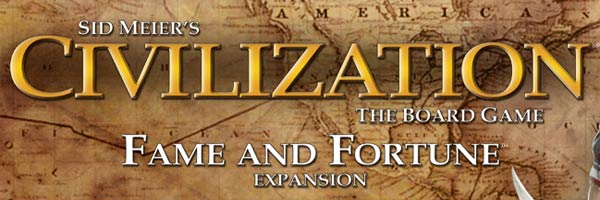
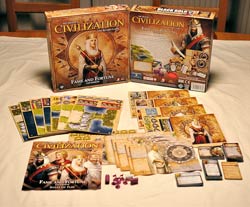
I’m a big fan of the new Civilization board game (as well as the computer game). I stated in my review that if an expansion ever came out, that I would pick it up immediately. Well, last fall, Fantasy Flight Games released Fame and Fortune, and I didn’t waste any time picking it up. Unfortunately, we have a lot of board games that we play, so I’ve only gotten to have a handful of Civ games with the expansion. This is one of the reasons that I’ve waited so long to write a review; I was hoping to get a few more games under my belt before settling on a final opinioin. But since I recently reviewed the Gods & Kings expansion for the PC game, I thought I'd go ahead and throw my opinions on the board game expansion out there too.
Table of Contents
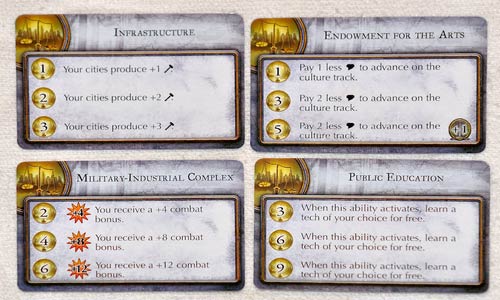 Investing your gold coins provides permanent bonuses, but subtracts them from the coins you have available for the Economic Victory.
Investing your gold coins provides permanent bonuses, but subtracts them from the coins you have available for the Economic Victory.
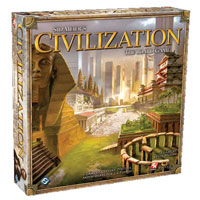
As a fan of the Sid Meier’s Civilization video game series (particularly, Civilization IV - which I argued on Geek Fights is the best video game ever made!), I was skeptical - but also excited - at the prospect of a Civilization board game based on my beloved game franchise. Could the feeling of building a civilization to stand the test of time and the one-more-turn addictiveness of the video game be replicated in a board game without the game itself becoming too long and boring? Well, put simply, it can! And Sid Meier’s Civilization: the Board Game is proof!
Table of Contents
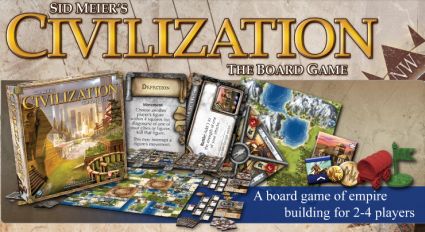
[More]
ef0d8725-0449-417c-9d33-7f60bbc67ddc|3|5.0
Tags:Civilization, Sid Meier, Sid Meier's Civilization, Sid Meier's Civilization the Board Game, review, board game, Fantasy Flight, strategy, Geek Fights, Civilization IV, Civilization V
|

| 12 | | | | | | | 60 | | 11 | | | | | | | 55 | | 10 | | | | | | | 50 | | 09 | | | | | | | 45 | | 08 | | | | | | | 40 | | 07 | | | | | | | 35 | | 06 | | | | | | | 30 | | 05 | | | | | | | 25 | | 04 | | | | | | | 20 | | 03 | | | | | | | 15 | | 02 | | | | | | | 10 | | 01 | | | | | | | 05 |
|